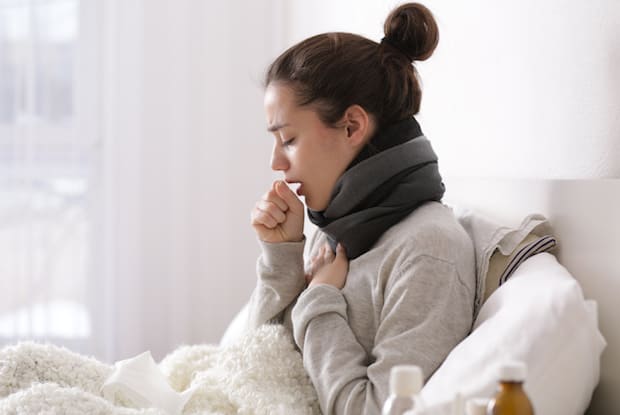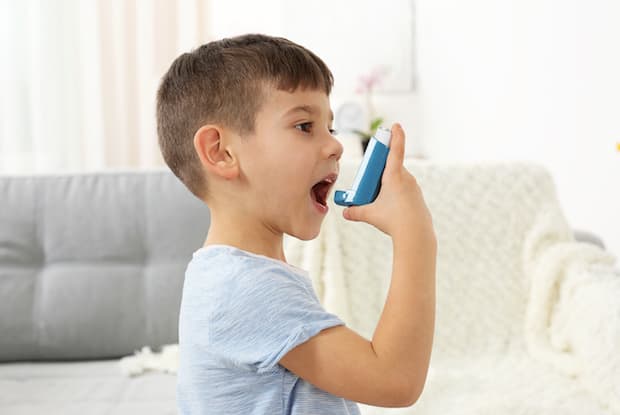Table of Contents
What is Asthma?
Asthma is a condition that affects more than 25 million Americans. It is the most common chronic disease in children, although it can affect people of all ages. [1] Asthma causes your airways to become narrow, which makes breathing more difficult. Moderate and severe asthma can have a negative effect on a patient’s quality of life.
Asthma varies from person to person. When asthma symptoms occur, they can range from mild to severe. Some patients may have regular flare-ups and asthma attacks. However, other patients may go long periods of time without an asthma flare-up or only suffer asthma symptoms when they are exercising. [2]
Although there is no known cure for asthma, medications are available that can keep the symptoms of asthma controlled. Long-term medications include corticosteroids such as Flovent HFA (fluticasone) and combination medications such as Advair HFA (fluticasone/salmeterol). Doctors may also prescribe a quick-relief inhaler to relieve a sudden asthma attack or to prevent an asthma attack before exercising. A common rescue inhaler is Ventolin HFA (albuterol). Depending on the severity of asthma and the frequency of asthma attacks, some patients will use both long-term and quick-relief inhalers.
It is well-known that one of the main symptoms of asthma is difficulty breathing. This can take the form of many different symptoms. The most easily identifiable sign of breathing problems is having shortness of breath or feeling like you cannot get enough air. This can result in the patient breathing rapidly in order to inhale enough oxygen. A quick-relief inhaler is often used during this event. As well as shortness of breath, asthma can also cause other breathing troubles, including coughing, chest tightness, and wheezing. Wheezing while exhaling is a common sign of childhood asthma. All of these symptoms of asthma may also cause sleeping problems. [3] Asthma occurs when the airways become inflamed and swell after coming into contact with a trigger. The swelling of the airways reduces the amount of air that can pass through, causing breathing difficulty, wheezing, coughing, and chest tightness. The exact cause of asthma is not known. However, researchers believe that it is caused by a mixture of genetic and environmental factors. The World Health Organization believes that these two factors play an equal role in patients developing asthma. [4] It is very common for asthma patients to also have close relatives with the condition. However, genetics is not the only cause of asthma and many patients develop the condition without having a family history of asthma. Air quality and air pollution can be key factors in developing asthma, especially when asthma develops during adulthood. Around eighty percent of asthma patients are allergic to things that can be found in the air. These include grass, pollen, dust mites, and animal dander. [5] Other environmental factors that may affect developing asthma include exposure to pollution, exhaust fumes, chemicals, and second-hand smoke. These chemicals in the air can irritate airways and cause them to swell or become inflamed, similar to what occurs during an asthma attack. As well as genetic and environmental causes, there are other risk factors that may increase your risk of developing asthma such as being overweight or smoking. As previously mentioned, some asthma patients suffer from asthma attacks and asthma symptoms regularly. Other patients may only display the symptoms of asthma very infrequently or during exercise. Different people have different triggers that cause an asthma flare-up, although some triggers are more common than others. Exercise is the most well-known trigger of asthma flare-ups and affects around four-fifths of people with the condition. Often, exercise is the primary trigger of symptoms and many asthma patients use an inhaler as a precaution before beginning exercise. A slow warmup can help prevent asthma symptoms from returning 6-10 hours after exercise. [5] As mentioned previously, most asthma patients have allergies to things found in the air. Substances, including pollen and dust, can cause flare-ups of asthma. These are often the same substances that cause hay fever. As well as allergens in the air, food allergies may also occasionally trigger asthma symptoms. Smoke can trigger asthma flare-ups. This can be a result of the asthma patient smoking or inhaling second-hand smoke. As well as triggering an asthma flare-up, smoking can worsen asthma symptoms such as coughing, disturb your sleep and lessen the effects of asthma medication. [6] Air pollution can be a key factor in causing asthma and can also trigger existing asthma. Those with severe asthma can find out the air quality in their area online, from television, or radio so they can plan their outdoor activities. The content in this article is intended for informational purposes only. This website does not provide medical advice. In all circumstances, you should always seek the advice of your physician and/or other qualified health professionals(s) for drug, medical condition, or treatment advice. The content provided on this website is not a substitute for professional medical advice, diagnosis or treatment.
a. Symptoms of Asthma
Causes of Asthma

Asthma Triggers
a. Exercise

b. Allergies
c. Smoking
d. Air Pollution
